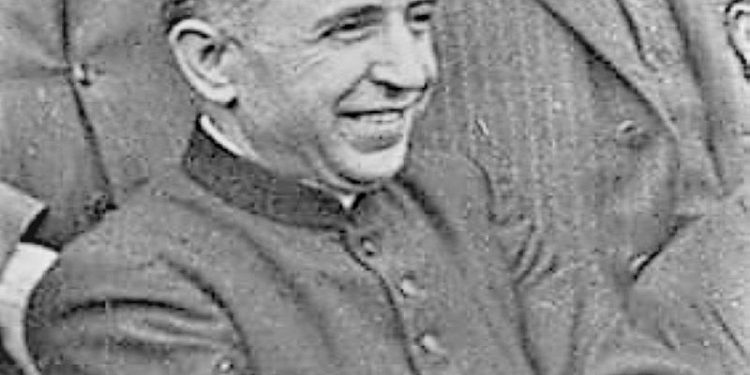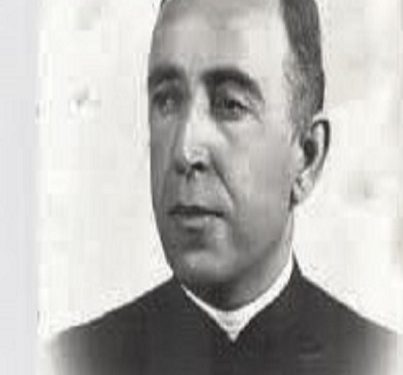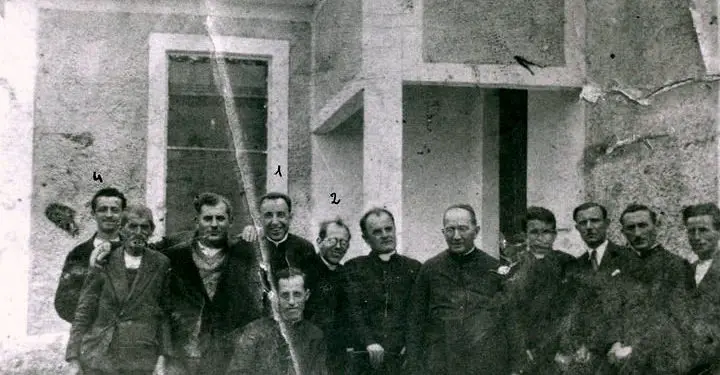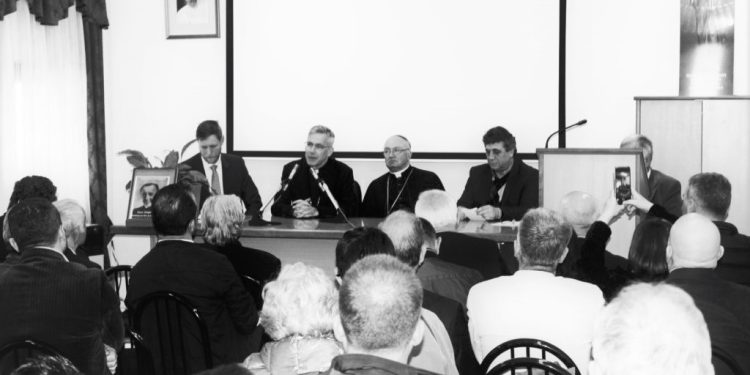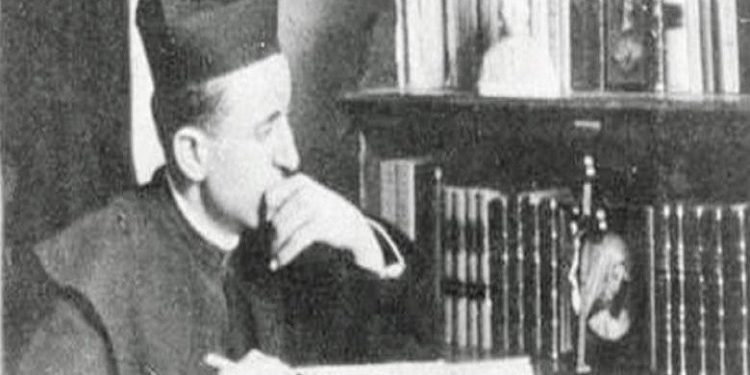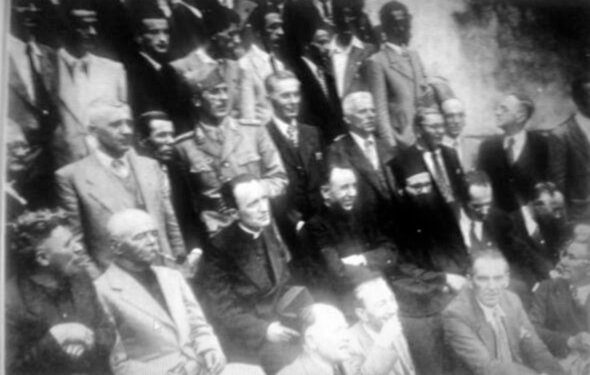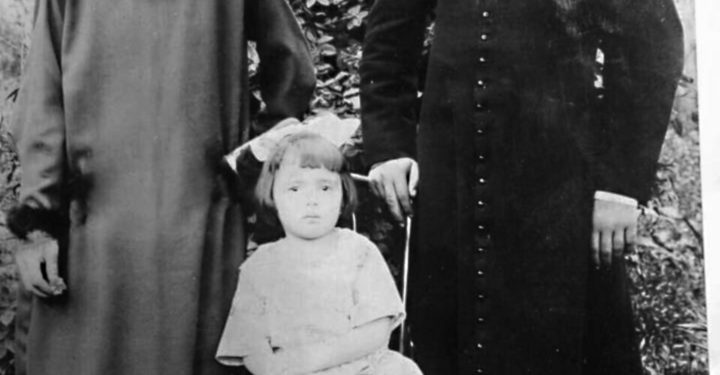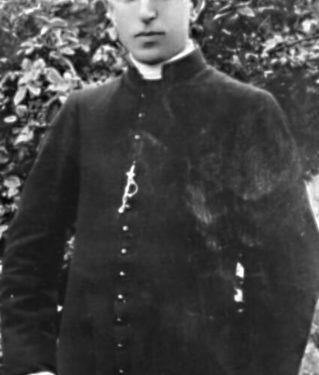NIKOLLË LOKA
Av. ALFDRED DUKA
NIKOLIN KURTI
Part thirty one
– THE FORECAST MURDER OF A CLERGYMAN OF THE RENAISSANCE –
Memorie.al/Before we begin to briefly analyze the investigative and judicial file in charge of the defendant Shtjefën Kurti and others, for the reader we will make a parenthesis of the right and its history in human society, with the goal of coming to our criminal and procedural law, from its beginnings and throughout the years of the dictatorship.
A review of the first trial, to understand the second trial
This is the Prosecutor’s Claim, at the end of the trial against the defendants: Shtjefën Kurti, Mark Marku, Agostin Preçi, Pjetër Biba, Zef Nishi and Fran Noci, accused of hostile activity against the People’s power for the criminal offense of “sabotage” according to articles 72 and “Agitation and propaganda” provided for by Article 73 of the Criminal Code, as well as against the defendant Ndue Leti, accused according to Articles 73/1 and 80/1 of the Criminal Code.
Every reader, without having any kind of legal culture, understands that this is a political pamphlet. From the legal side, based on the “legal criminal and procedural norms of the time”, from any person who has the slightest knowledge of this science, it is a montage of accusations with ordinary falsifications up to that of facts, dates, as well as changing the times of the facts criminal offense with a single purpose, the placement of the defendant, the priest Dom Shtjefen Kurti, at the head of a sabotaging organization, by means of the maneuver of changing the legal qualification of the criminal offense of theft, to that of sabotage. All this is done with the criminal intent of capital punishment of the priest, since there was no other possibility to implicate him with the other people who committed theft, except to qualify him as the instigator, or the pusher, roles that are not they could lead him to be shot.
So, there was the possibility to qualify him as an instigator, according to the provisions of Article 13 of the Criminal Code of the time, but they could not give him the qualities of the organizer nor that of the executor, since there was no element to get them these qualities, as a result, only with one of these qualities, they could sentence him to death, according to the “order” they had received from the Leadership. Of course, both provisions, such as that of “theft in large proportions”, and that of “sabotage”, had the maximum penalty of death, but with this qualification, the priest did not result in the positions of executor or organizer, since firstly, the accusation from the public opinion would not be credible at all and secondly, he could be shot only in the case of the execution of some of the other collaborators, an action which would be very disproportionate in the opinion and as such, should be avoided . Ways? Sabotage was invented. An unscrupulous invention, which had nothing to do with the law and the accumulated evidence, but it, had to, it had to, and that’s how the leadership wanted it!
Article 13, Associates
“Co-workers are called, in addition to executors and organizers, pushers and helpers. Executors are the persons who directly participated in the commission of the crime. Organizers are the people who created a criminal organization or who lead it, as well as the people who prepared the plan to commit the crime, or who lead its commission. People who pushed others to commit the crime are called instigators. “Auxiliaries are persons who have provided assistance in the commission of the crime by giving advice, instructions, providing tools and removing obstacles, or by promising to hide the criminal or the traces of the crime.”
From the legal analysis of this provision of the general part of the Criminal Code of the time, it is determined what are the qualitative roles in the commission of a criminal offense in the form of cooperation. We brought this provision in full, for the reader to understand that the law-enforcement ustallars of the time found it quite impossible that, with the definition of the criminal offense of theft, the defendant Dom Shtjefen Kurti would be attributed a leading role in the theft, so it had to be fabricated another criminal offense and it was invented, as we have pointed out, that of sabotage, since in this offense it was easier to give him a leading role, with the aim of punishing him with death!
Article 14 Responsibility of collaborators
“Organizers, instigators and helpers for the crime committed have the same criminal responsibility as the executors. In determining the punishment for the collaborators, the court must take into account the degree and character of the participation of each of them in the commission of the crime. The participant of the criminal organization has criminal responsibility not only for the crimes in which he participated directly, but also for the crimes committed by other participants of the criminal organization, if he had knowledge that the commission of these crimes was included in the plan of activity of the criminal organization. The instigators and aides are criminally liable for preparation according to Article 10 of this code even if the person they instigated to commit the crime or to whom they gave assistance does not commit any criminal act”.
So the law provides that: Organizers, instigators and helpers for the crime committed have the same criminal responsibility as the executors. In determining the punishment for the collaborators, the court must take into account the degree and character of the participation of each of them in the commission of the crime”
From this paragraph it is understood that the persons accused in the above capacities are criminally responsible, but in determining the punishment, the court must take into consideration the degree of participation of each person in the commission of the crime. It was this prediction that prevented the court from placing the defendant Dom Shtjefën Kurti in charge, with the predetermined goal of his capital punishment.
Then the legal classification of the actions of the whole group was changed. However, this change is easily legible as it was carried out for extra-legal purposes, having no connection with the actions and inactions of the other defendants. This difference is so true that, both in the claim of the Prosecutor and in the decisions of the courts, the search and reasoning throughout their entire extent, speak of theft and agitation and at no time of sabotage. Let’s see them in turn.
By drafting an absolutely untrue claim, as it pertains to the criminal offense of sabotage, the Prosecutor allows himself such nonsense. We say nonsense, since in the sense of the law he commits a crime, to come up with the famous postulate “every criminal act leaves traces and these traces lead to their author”, since there is no perfect crime. Thus, the Prosecutor commits a crime, which the court of Kruja gives the form of law, to reach the Supreme Court, which does not remain after that, to conclude it in the Presidium of the People’s Assembly, which leaves in force the decision to shoot Dom Kudos to Kurt! The prosecutor, and then the courts, try to attribute the failures in the cooperative system to several thefts committed during 1958 and the following years, until the arrest of the group at the beginning of 1970, to give the connotation of the collapse of the Gurezi cooperative, with in order to justify heavy punishments, but the lack of knowledge about agricultural work, has led to the serious blunder that follows:
“…In 1970, thanks to the organizational, educational and persuasive measures that were taken, as well as the attack and elimination of this hostile group, increased the trust of the cooperatives towards the common work and increased their interest in the problems that concern the cooperative. This resulted in the Gurezi sector not only coming out of the backwardness, but being the best sector of this cooperative in these years. The figures and facts mentioned by the many discussants who took the floor in this trial were meaningful and convincing for the drawn conclusion. The question arises? Would the defendants have been able to achieve the destruction of the Cooperative with their activities? We are very sure that they will not even be able to realize their dream because here in the village of Gurëz, a people lives and works that is closely connected to the party, to the cooperative, that loves and protects the property of the cooperative like the eyes of the forehead who looks at it with optimism, who is proud of success but never agrees with flaws. This is where the communists, cadres, government bodies, and others are active, which sooner or later are able to discover, capture and attack any activity that harms the interests of the Party and the state. Even these activities of these defendants are precisely the communists, cadres, and the people of Gurëz themselves who discovered it”.
After this paragaffe of the prosecutor in his claim, by falsifying and shifting the times of the “criminal facts”, we come to the logical and legal self-distraction of his accusation. The prosecutor claims that:
“…The hostile activity of these defendants reached the highest level under the direction of the defendant Shtjefen Kurti during 1969. In the summer of 1969, the defendant Shtjefen Kurti, Zef Nishi and Pjetër Biba meet in the room of the defendant Shtjefen where, all three conduct conversations of a hostile nature, such as for the overthrow of the government and others”.
So the peak of the hostile activity of the defendants was during 1969. Well, the pragmatic dinner was eaten at the end of November, or at the beginning of December 1969! By giving extraordinary attributes to this dinner, the accusation and the court have subsequently negated themselves, connecting the worst time of the cooperative with its best time, with a period of only one month, which does not have any kind of practical possibility, since the jobs of agriculture, for any kind of achievement or production harvest, they require a preparatory work, at least six months, plus the sowing-harvest cycle, for the crops, let’s say October-June-July, or corn and other products that coincide with the time period, March-April and their harvest in October-November! “…In 1970, thanks to the organizational, educational and persuasive measures that were taken, as well as the attack and elimination of this hostile group, increased the trust of the cooperatives towards the common work and increased their interest in the problems that concern the cooperative. This resulted in the Gurezi sector not only coming out of the backwardness, but being the best sector of this cooperative in these years”.
If we are to believe the analysis of the prosecutor and the courts afterwards, the famous dinner turns out to be the prelude to bringing the Gurëzi cooperative out of the back and by no means the peak of hostile activity! Forgeries follow one another. It is proven in tents and hundreds of acts that are in the operational tracking files, during the processing of 2/B and 2/A, as well as the investigation, that the famous dinner was eaten at the end of 1969, while the Prosecutor moved it, in the summer of the same year, with the intention that the last months of 1969 were the peak of hostile activity! In a few paragraphs below, the Prosecutor also accepts this, forgetting what he wrote above. Here’s what he says: “…At the end of 1969, at the dinner organized with the participation of the defendants: Shtjefën Kurti, Mark Marku, Zef Nishi and Pjetër Biba, where Dava and Prena Biba assisted for a while, in addition to the conversations about the overthrow of the government, to escape abroad and others, it is said by the defendant Shtjefe that they stole with the aim of making people unhappy, to reduce the value of the working day, to raise people in revolt for the destruction of the cooperative. Even after this, the defendants Mark Marku, Zef Nishi and Pjetër Biba explain, we continued the thefts to carry out this order. The conversations held at this dinner, apart from the four defendants, are also explained by the witnesses Dava and Prena Biba”.
Deceiving requires at least a strong memory, and the Prosecutor, who was considered as the scarce waters of justice at that time, stood out for his preparation, so much so that he ended his career as a member of the Constitutional Court, but he was not as good as to erase his tracks! Not even mafia groups commit such forgeries and to think that this claim has been turned into a court decision and this decision is upheld with the same reasoning by the Supreme Court of the Republic of Albania, this is a shame!
In order to “prove beyond any reasonable doubt” the charges, the Prosecutor assumes the attributes of the chairman of the cooperative, according to the following paragraph, giving relevant advice and instructions:
“…Don’t be like storekeepers, brigadier, guards, transporters, etc., people like Luigj Vates, Gjok Marka, Diles, Marash Prekős, Zef Pali Beqiri, Mark Marku, Pjeter Bibes, Pjeter Mitzhit, etc., because this is like hanging a wolf’s liver around its neck. In these tasks, people should be appointed who, apart from doing the work, are at the same time honest, uncompromised and who care about the common property. And there are many such people everywhere. Also, give due importance to the movement of goods, agricultural products, from the field to the warehouse, from the warehouse to the mill, to the oven or to the market. Strictly apply all state rules on the circulation of goods, because in every violation of these rules, it forms a loophole that the enemy and evil element exploits to the best of their abilities, just as this group has exploited to achieve its goals criminal. Do not underestimate the implementation of the rules and justify weaknesses with the lack of scales or other tools, in campaigns or production needs. Trust in people must exist, but in addition to this, there must be strict control over people, and this control cannot be done outside of the implementation of state rules on the circulation of goods”.
This is a variety show in itself, but a tragic variety show!
“In these cases, the defendant Shtjefe became aware of the thefts that Zef Nishi was carrying out with Pjetër Bibi and at the end of the conversation, he said to the other defendants that: steal, steal your sweat. Defendant Pjetër Biba explains that in the summer of 1969, at the end of our conversations, Shtjefni said: steal, because you get your sweat. Earlier, – says the defendant, – I had explained to Shtjefni that Zef Nish and I were stealing. In relation to this, the defendant Shtjefen Kurti said: I told Zef Nish that it is better to steal, so the people’s income is reduced, and the people rise up and destroy the cooperative, and even rise up and steal others. “.
The answer of the defendant Dom Shtjefën Kurti, placed in the last paragraph, it is easy to understand under what conditions this statement was taken, since none of all the defendants has declared this phrase, without the beginning of the intensive investigation, which will says interrogation under the tutelage of all. However, at the beginning of this paragraph, it is emphasized that: “The defendant Shtjefën became aware of the thefts carried out by Zef Nishi with Pjetër Bibi and at the end of the conversation, he told the other defendants that: steal, steal your sweat” . So at the end of 1969, the priest found out that these people were stealing (not sabotaging), but 1970 turned out to be a successful year, according to the prosecutor! In this way, the prosecutor rotates facts and statements, which exclude, or “fight” with each other, which from everyone, it is understood that it was an inedible soup from no one!
The prosecutor continues his claim as follows:
“The explanations given by the defendant Mark Marku also confirm the defendants Pjetër Biba, Fran Ndoci and to some extent also the defendant Ndue Leti. Regarding this, the defendant Fran Ndoci explained: “We started the conversations from 1963 – 1964, with Mark Mark, we talked about the bad life in the cooperative and the good ones when we were private. We wanted the cooperative system to change and the private system to follow. Below, the defendant Fran Ndoci explains that in subsequent conversations with the defendant Agustin Preçi, we compared life in Albania with that in foreign countries. We talked about freedom in these countries; we talked about escape, about undermining Stalin’s moment, etc. Our conversations in this direction, says the defendant Fran, are countless. I, – says the defendant, – I want the cooperative to join”.
From this paragraph it is understood that the time of the start of this activity was before Dom Shtjefën Kurti was released from prison.
“…Even the defendant Ndue admitted to the investigator as well as before the court that with the aforementioned defendant, others also had friendly conversations. The defendant explains: “We talked that the cooperative system is not good, it is not in favor of the people, it does not allow you to develop private wealth and have a good income. In 1962 to 1965, with Mark Mark they said that the cooperative system is not for the good of the people. We spoke against the cooperative system. I called the measures to reduce personal gardens unfair, which impoverished the people”. “The defendant Zef Nishi explained that Ndue Leti spoke to me about the low income, about the difficulties and as the cause of this situation he called the cooperative and the cooperative system”.
This paragraph postpones even further in time the hostile activity “directed and organized” by Dom Shtjefën Kurti.
The claim continues with the following tag:
“…From the evidence collected during the investigation of the case, as well as from those administered during its trial, it was found that the charges against the defendants: Shtjefën Kurti, Mark Marku, Agustin Preçi, Zef Nishi, Fran Ndoci, for the crimes foreseen from article 72 and 73/1 of the Criminal Code, is proven. The defendants therefore committed the crime of sabotaging the economy through theft and damage, and at the same time they developed agitation and propaganda against the popular government. Also, the charges against the defendant Ndue Leti for the crimes provided for by articles 73/1 and 80/1 were proved”.
Here we have an “invention”. So the defendants have committed the crime of sabotaging the economy through theft…! Theft transforms into sabotage!!! Article 72 of the Criminal Code of the time provides: “Sabotage, i.e., action or inaction aimed at undermining the industry, agricultural economy…”! So theft is not mining, but theft! What is the total amount of this theft that the prosecutor accuses as sabotage?! The Prosecutor himself gives us this answer, and even the courts afterwards: “…The defendant Ndue Leti for a long period of time since 1962 in collaboration with the defendant Pjetër Biba and later from 1965 in collaboration with the defendant Mark Marku , has appropriated the surplus created in the cooperative’s mill, selling 200 kg. Easter Mirit corn flour, 150 kg. Fran Nokos, 100 kg. Good luck to Ali Hysen.
In the year 1964 – 1965, the defendant Ndue sold 150 kg of the appropriated grain. Easter Mirit again. In cooperation with Mark Mark, they sold 300 kg. corn flour Martin Rrokut, while 200 kg. Bajram Cafit. In 1966-1967, the defendant Ndue Leti, in cooperation with the defendants Fran Ndoci and Bajram Cafi, stole 700 kg at night from the warehouse of the third brigade. corn and the realized money they divided between them. In 1968, the defendant Ndue, in agreement with Gjok Niko, embezzled 330 kg on four occasions. corn, dividing it between them. In 1968, from the cooperative’s mill, Ndue Leti acquired 12 pieces of bags, 100 kg. wheat and 20 kg. corn, he sold to Kol Shyti, as well as 116 ALL from the irrigation of the agricultural cooperative Lezhë Island. In these conditions, the defendant Ndue Leti has committed the crime provided for by article 80/1 of the Penal Code by co-appropriating cooperative property in the amount of 5900 ALL. Also, the defendant Ndue Leti and Pjetër Biba, during the year 1968-1969 and with other persons, have gambled thus committing the crime provided by article 285/11 of the Criminal Code. Memorie.al




